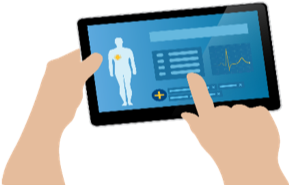De-mystifying the Qualification of Decentralized Clinical Trials
Decentralized clinical trials (DCTs) offer a more patient-centric approach, reflecting a transformational philosophy for the conduct of clinical trials in which fewer clinic visits are required and patient and caregiver burden is reduced. To achieve this, DCTs deploy a wide range of digital technologies to collect safety and efficacy data from study participants, normally from the comfort of the patient’s own home.
The specific digital technologies used for data collection vary by study but can include telemedicine, wearable/sensor devices, eConsent, electronic clinical outcome assessments (eCOA), and electronic health (eHealth) records. Mobile technologies are often used to replace written diaries with electronic diaries and to collect data from wearable sensor devices. In-home services allow the collection of vitals such as blood pressure and blood samples.
While the benefits of DCTs are many, companies experience challenges during the implementation of technologies to support the studies, including the need to qualify not only technology providers but also the technologies themselves. Ensuring the quality of incoming data, which is often substantially greater than with analog methods, presents its own challenges.
Benefits of Decentralized Clinical Trials
There is general recognition that DCTs benefit the industry, patients, and caregivers in many ways:
- Patient Centricity: DCTs offer a more patient-centric approach by allowing patients to participate in clinical trials from their home. This is especially helpful for patients with mobility issues or who do not reside near a clinical trial site.
- Population Diversity: Access to a larger geographical footprint might result in a more diverse patient population.
- Patient Recruitment: In addition to gaining access to a larger population via a larger geographical footprint, DCTs also require less frequent site visits, enhancing patient recruitment.
- Patient Retention: By requiring fewer site visits, DCTs decrease the burden for both patients and caregivers, contributing to patient retention.
- Collection of Additional Data: By deploying mobile technologies, DCTs can collect a greater quantity of data from patients over time than what might be collected in traditional site-based clinical studies. Data collection during site visits is limited by visit frequency and length.
- Reduction in Source Data Verification: When deploying mobile technologies, DCTs deliver data from the source, thereby reducing the need for data verification.
- Additional Capacity at the Site: DCTs can reduce the time, burden, and cost of managing patients at the investigator site. Although there are also costs associated with in-home health care visits, investigators can use the efficiencies gained to expand the number of trials they can conduct simultaneously.
- Pathway to Virtual Clinical Trials: Biopharmaceutical companies often have a tendency toward conservative, risk-averse behaviors. With DCTs, these companies can incrementally adopt digital practices, moving the industry toward the future of virtual clinical trials.
Challenges with Decentralized Clinical Trials

When migrating to DCTs, it is important to consider some of the following challenges:
- That, while some regulatory agencies are supportive of innovative trial designs, guidelines on compliance expectations for DCTs are lacking.
- The need to adapt internal quality management systems (e.g., policies, SOPs, training).
- The learning curve for project teams, sites, patients, and caregivers.
- Differences in state telemedicine laws that may preclude some site-to-patient interactions.
- The difficulty of harmonizing the aggregation of large amounts of data when using mobile sensor devices.
- The chain of custody of the investigational product if sent directly to patients.
- The investment in regulatory compliant technologies that are easy to use.
- Qualifying technologies prior to their use, to ensure safety, quality, and compliance.
- That the relationship between the patient and the principal investigator/study coordinator might become more difficult to foster in the context of a DCT. According to Ken Getz of the Tufts University School of Medicine, patients value this relationship.
As the industry moves to greater adoption of digital technologies and remote visits in clinical trials, it can be difficult in the early stages to be confident in choosing providers that will not only provide the best technology/service but also protect the patient’s privacy while providing data in the right format at the right time. Also, without clear regulatory guidance, how can you be certain that adopting DCT principles will not risk the success of your submission?
Collaborative Solutions
For biopharmaceutical companies to overcome these challenges, The Avoca Group recognizes that collaboration is essential. By leveraging the pre-competitive collaboration inherent to The Avoca Quality Consortium® (AQC), any of the DCT concepts, such as wearable/sensor devices, can be incrementally introduced into new trials. A hybrid approach can be adopted, by mixing on-site patient visits with remote visits via mobile clinical trial home health care providers or telemedicine.
To address the questions of choosing the right technology partner and avoiding risk to your trial by adopting technology, in 2019, the AQC is set to explore these challenges and develop solutions as follows:
- Provider Qualification (PQUAL) Workstream
- Risk Based Quality Management (RBQM) Workstream

The PQUAL workstream will develop industry standards that are mapped, where possible, to regulations and guidance. These standards will support the qualification of technology product/service providers in the context of clinical trials, reducing risk around finding the right provider partner and supporting compliance with the Good Clinical Practice (GCP) guidelines. The initial plans include developing qualification standards related to their use in clinical trials for:
- Mobile home health care provider visits and telemedicine
- Using eHealth records
- Technologies that support digital trial oversight
Similarly, the RBQM workstream will develop leading practice processes, guides, tools, and templates to reduce risk surrounding the data collected and focus on data quality and compliance during the practical and efficient use of DCT technologies. The planned deliverables will include:
- Central monitoring, trend assessment, and management standards for data aggregation and review
- Leading practices for study oversight using digital oversight technologies
Through shared knowledge management, the AQC can increase awareness of prospective risks with these technologies, allowing the industry to develop risk mitigation strategies and increase their confidence in their implementation of DCTs.
DCTs are a logical and, some might say, necessary transformation for the clinical trial industry. However, like most transformations, collaboration is vital to developing leading practices, reducing risk, and assuring quality and compliance. By working together to develop and access a shared knowledgebase, the clinical trial industry – and the patients it serves – could greatly benefit from a move toward DCTs.
